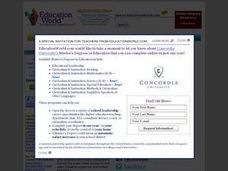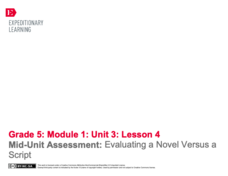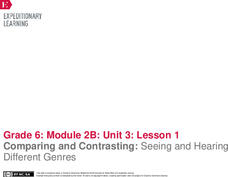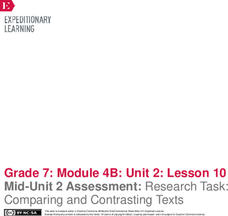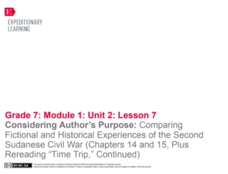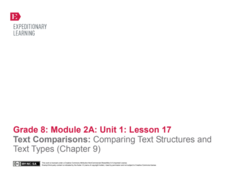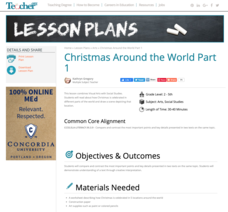Core Knowledge Foundation
Different Lands, Similar Stories Tell It Again!™ Read-Aloud Anthology
A read-aloud anthology highlights how one story differs depending on where it comes from. Scholars listen carefully to familiar and new stories, participate in discussions, and complete word work practice. Extensions for each lesson...
Livaudais-Baker English Classroom
Kindred
This first in a series of four resources is designed for instructors to use Octavia E. Butler's Kindred in their classes. The packet includes an overview of the unit, a day-to-day calendar, links to background articles, and reading...
EngageNY
Getting the Gist and Determining Word Meaning: Paragraphs 12–14 of Steve Jobs’ Commencement Address (and connecting to Chapter 8)
Groups use a Venn diagram to compare the theme of love and loss in Steve Jobs' 2005 commencement address to Stanford University students and Christopher Paul Curtis' Bud, Not Buddy.
Curated OER
Caves
Explore caves with your class! Your scholars will participate in scientific observation, research, inference and deduction, reading, vocabulary, and writing activities about caves with this lesson plan. This resource contains five...
Curated OER
Working on the Slant
Compare and contrast a major news story from various newspapers. How does the perspective change? Are certain things included in some of the stories and left out of others? Have pupils complete a graphic organizer to compare how...
Texas Education Agency (TEA)
Annotate and Analyze a Paired Passage: Practice 1 (English II Reading)
What do a colt and a boy in a tree have in common? More than might be first apparent. The fourth interactive in a series of ten introduces readers to intertextuality, the process of using abstract thinking to consider how one text...
K20 LEARN
Just Say No!: Exploring Temptation Through The Lotus Eaters
Teenagers face many temptations, and just saying "No!" can be very difficult. Here's a lesson plan that provides some help. Learners use a Venn diagram to compare and contrast excerpts from The Odyssey, Tennyson's "The Lotus-Eaters," and...
Newseum
From the Front Page to the History Books
Young journalists compare news coverage of four major events with how the same events are covered in historical accounts. The ensuing discussion asks class members to compare and contrast the role of a reporter and the role of a historian.
EngageNY
Building Background Knowledge: Jigsaw to Build and Share Expertise about the 2010 Haiti Earthquake, Part 2
Calling all experts! Using the educational resource, pupils work together in small expert groups, reading an article about the 2010 Haiti earthquake. As they read, they record two main ideas and supporting details from the text.
EngageNY
End of Unit 1 Assessment: Analyzing an Interview with a Rainforest Scientist Part 2 and Comparing and Contrasting Texts About Rainforest Biodiversity
The end is in sight. Pupils complete an end of unit assessment, analyzing an interview with a rainforest scientist and then comparing and contrasting two informational texts. Next, they complete a self-assessment to reflect on their...
EngageNY
Mid-Unit Assessment: Evaluating a Novel Versus a Script
How are novels and scripts alike and different? As part of the mid-unit assessment, scholars complete a Venn diagram to compare two types of writing: a novel and a script. Next, they respond to short-answer questions, evaluating passages...
Roy Rosenzweig Center for History and New Media
George Washington: General, President, Slave Owner
Times change; behaviors that were once considered acceptable can be seen in a very different light. Middle schoolers revisit the legacy of George Washington in a three-day lesson plan that uses primary sources to reveal Washington as a...
EngageNY
Comparing and Contrasting: Seeing and Hearing Different Genres
Let's compare and contrast! Scholars use a Venn diagram to compare and contrast the experience of reading a poem and listening to its audio version. Next, they complete graphic organizers, comparing two different genres: a poem and a...
EngageNY
Mid-Unit 2 Assessment: Research Task: Comparing and Contrasting Texts
It's the half-way mark! Pupils demonstrate understanding of unit standards by completing a mid-unit assessment. After reading an informational article about water management strategies, scholars complete a graphic organizer to identify...
EngageNY
Gathering Information about Water Management: Assessing and Reading Internet Sources, Day 3
Water is life! Using the informative resource, scholars first read two informational articles about water management in agriculture. Then, they use a Venn diagram to contrast the different types of evidence authors use to support a...
EngageNY
Contrasting Authors’ Use of Evidence: Bottled Water
Apples to oranges, Dasani to Aquafina. Using a Venn diagram, scholars contrast two authors' use of evidence on the topic of bottled water. Additionally, they continue reading Charles Fishman's The Big Thirst and answering text-dependent...
Encyclopedia Britannica
Meta-Study: Political Brains
Are there differences in the brains of liberals and conservatives? That is the question young political scientists are challenged to answer. Class members examine studies, consider how the results are presented, and how the studies were...
EngageNY
Mid-Unit Assessment, Part II: Research Task: Comparing and Contrasting Texts
When it comes to comparing texts, it's apples to oranges. As part two of the mid-unit assessment, learners compare and contrast two texts about the Internet and brain health. While reading, scholars use a Venn diagram to compare two...
EngageNY
Considering Author’s Purpose: Comparing Fictional and Historical Experiences of the Second Sudanese Civil War (Chapters 14 and 15, Plus Rereading “Time Trip,” Continued)
Is that a true story? Readers work to gather evidence for comparing the historical and fictional text Time Trip: Sudan’s Civil War and A Long Walk to Water. Scholars identify the use of real people and experiences versus the use of...
EngageNY
Mid-Unit 2 Assessment: Comparing Fictional and Historical Texts
Class members pair up to discuss how the author of A Long Walk to Water altered history. They then work independently on Mid-Unit 2 Assessment: Comparing Water for Sudan and A Long Walk to Water. Readers close the lesson plan thinking...
EngageNY
Comparing Historical and Fictional Accounts: Second Sudanese Civil War (Chapters 14 and 15, Plus Rereading “Time Trip”)
Let's compare! One pair of scholars adds to the Salva/Nya anchor chart by gathering evidence about the characters from chapters 14 and 15 of A Long Walk to Water. The rest of the class pairs work on adding to the Survival anchor chart....
PBS
Exploring the Drive to Create in Frankenstein
Is it hubris that drives the creative process? Is it the desire to be remembered long past death? An interactive asks readers of Mary Shelley's novel Frankenstein and Percy Shelley's poem "Ozymandias" to consider what this wife and...
EngageNY
Text Comparisons: Comparing Text Structures and Text Types (Chapter 9)
Scholars revisit the comparisons they made in the previous lesson of "Incident" and To Kill A Mockingbird. They talk with their discussion appointment partners about the structure of a narrative and use a Compare and Contrast Note...
Teacher.org
Christmas Around the World Part 1
A creative lesson shines a spotlight on Christmas celebrations throughout six different countries. Scholars read an informative text and share their new-found knowledge with their peers. After hearing about each country, pupils choose...






